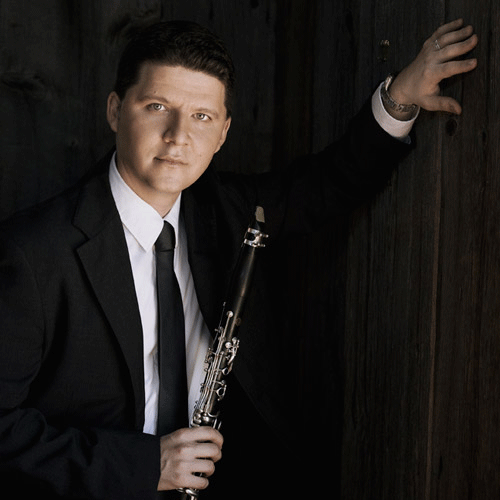New World closes year with varied chamber program from Mozart to Harbison

Alexander Fiterstein performed Mozart’s Clarinet Quintet with New World Symphony members on Sunday afternoon.
Three contrasted works by 20th- and 21st-century composers and a late Mozart masterpiece comprised the typically enterprising menu for the New World Symphony’s chamber music program Sunday afternoon at the New World Center.
One significant aspect of the concert was technological. Each of the musicians were playing their scores from iPads placed on their music stands rather than traditional print editions. While some soloists (notably Jeremy Denk) have utilized this device for their performances, New World is pushing the envelope for ensemble performances and the young players seemed to have adapted nimbly to the new mode.
John Harbison has long been one of America’s most significant composers, with symphonies and vocal scores that stand as important contributions to the concert repertoire.
Harbison’s Music for Eighteen Winds (1985) has much in common with Stravinsky’s Symphonies of Wind Instruments. Like that wind ensemble creation, Harbison’s eleven-minute work flows in astringent, neo-classical sonorities. Following an opening section replete with terse overlapping episodes, a chorale for four horns leads to a lengthy alto saxophone solo, suggesting jazz and the blues.
Concise and brilliantly conceived, the score displays Harbison at his inventive best and the New World players gave it a performance that bristled with momentum and forward drive. Dean Whiteside (the only artist of the afternoon woing from a printed score) conducted the ensemble with rhythmic snap. The rich, vibrant tone of Jeffrey Siegfried’s saxophone and the strength and solidity of the horn quartet (Roy Femenella, Priscilla Rinehart, Corbin Castro and Dominic Brancazio) were outstanding.
Bulgarian-born Dobrinka Tabakova’s Such Different Paths (2007-08) was the afternoon’s discovery. Scored for string septet, Yabakova’s riveting eighteen-minute score melds repetitive minimalism and folk influences with the ancient sound of a viol consort, and the spiritual raptness of Arvo Pärt and Henryk Górecki. The music alternates rapid episodes with more reflective and contemplative sections. At times, the musicians play the same figurations out of sync, yet Tabakova’s sonic landscape is entrancing and beautiful. Cellists Blake-Anthony Johnson and James Churchill carried the score’s darker, more soulful moments with fine ensemble contributions by violinists Jonathan Chern and Brendon Elliot, violists Spencer Ingersol and Yuan Qi, and bass Douglas Aliano.
The music of Paul Schoenfield incorporates Judaic traditions into a classical context. His 1986 Trio for clarinet, violin and piano was written to be played both as a concert work and as entertainment at Hassidic festivals. “Freylakh,” the trio’s opening movement, moves a klezmer-tinged dance theme through the pessimistic harmonic prism of Shostakovich. A sardonic march in the manner of Prokofiev is followed by the prayerful “Nigun.” A fast, foot-stomping finale “Kozatzke” concludes a score that radiates joy and hope amid dark musical clouds.
Anthony Quail’s clarinet had the tangy klezmer wail and agility for the rapid dance sections but also depth of tone for the solemn prayer. The wide vibrato and bold strokes of Harry Chang’s violin suggested the fluidity of a jazz or folk band player. Thomas Steigerwald negotiated the hand crossings and speedy riffs of the piano line adroitly.
Alexander Fiterstein was the featured guest artist in Mozart’s Quintet in A Major for clarinet and strings. Last March, Fiterstein gave an outstanding performance of the same work with the superb Dover Quartet for the Friends of Chamber Music, and appeared here with the Russian String Orchestra just last month.
Fiterstein is one of the finest solo clarinetists on the concert stage today. His trademark mellow tone and smoothly coordinated leaps between the instrument’s registers were on full display. He actually played the score with greater agility and grace this time around.
The problem was that his New World colleagues were not in his league and the performance took two movements to get off the ground. The slower tempo for the initial Allegro effectively underscored the sadness beneath Mozart’s aristocratic instrumental lines but Kenneth Liao’s scrawny violin tone proved an uneven match for their guest clarinetist. Violinist Yada Lee and cellist Ian Greenberg were just marginally better. Only violist Kip Riecken produced a sound that matched that of Fiterstein.
The performance belatedly took off with a spirited reading of the Menuetto with Fiterstein bringing some indigenous dance strokes to his phrasing and the strings providing greater strength and thrust. There was a lithe bounce in the strings for the delightful Allegretto con variazioni finale. Fiterstein’s mastery was front and center in the whirling figures of the first variation. The first two movements could have used more of the level of ensemble cohesion manifesting the finale.
The New World Symphony’s chamber music series continues with Haydn’s String Quartet in D minor, Hindemith’s Octet and Schumann’s Piano Quintet 2 p.m. January 20, 2019. nws.edu; 305-673-3331.
Posted in Performances
Leave a Comment
Mon Dec 17, 2018
at 2:17 pm
No Comments




